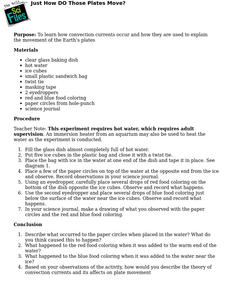Bonneville
Let's Build Our Wind and Solar Energy Toy
Who says toys can't be educational? The fourth of five parts in the Solar Updraft Towers unit has scholars create toys that run on solar and wind energy. The devices need to be solar updraft towers that can be placed on a warm surface...
Bonneville
Where Does Energy Go?
Convection currents aren't just a bunch of hot air. The second of five lessons in the Solar Updraft Towers unit focuses on energy transfer and convection currents. Young scientists watch six demonstrations that illustrate how warm air...
Museum of Science
Hot Air Balloon
It is more than just blowing hot air. Pupils first build a hot air balloon out of tissue paper by cutting enough panels of tissue paper to form a balloon shape and glue the panels together. Using a hot air gun, individuals then inflate...
Discovery Education
Motion in the Ocean
How do temperature changes affect ocean currents? Scholars explore convection currents by demonstrating the flow of water in a baking dish. They use ice, heat, and food coloring to see currents. Then, they draw conclusions about their...
NOAA
A Laboratory Simulation of Ocean Surface Currents
Stimulate interest in ocean currents with a simulation. The first installment of a five-part middle school series teaches future oceanographers about the forces that interact to cause ocean currents. A simulation shows how wind and...
Curated OER
Plate Tectonics
Help young scientists piece together the theory of plate tectonics with this comprehensive collection of materials. Whether your are looking for worksheets, hands-on activities, or assessments, this resource has everything...
Curated OER
Heat Energy - Energy Transfer
Here's a great selection of slides for a class being introduced to heat transfer. Types of materials that are good conductors or insulators are covered and the diagrams that accompany the information should make understanding more...
Curated OER
Ocean Streams
The instructions for demonstrating ocean turnover are provided in this resource. You could set this up for your earth science class as part of a lecture on convection currents or as an explanation of how ocean currents form. An animation...
Curated OER
Earthquake Formation
Students explore earthquakes. In this natural disaster and engineer career education lesson, students identify features of the earth's surface that increase the likelihood of an earthquake. Students use visual aids to locate the earth's...
Curated OER
GED Vocabulary: Earth and Space Science
In this earth and space science worksheet, high schoolers complete a crossword puzzle given seven clues and seven terms about earthquakes, the solar system, and convection currents.
Curated OER
Convection and Wind
Students use water, beakers, hot plates, paper dots, and goggles to participate in a hands on activity where they see how a convection current creates wind. In this convection current lesson plan, students participate in a hands on...
Curated OER
Convection Currents
In this convection current worksheet, students experiment with hot water in a beaker and a colored ice cube to demonstrate how convection currents work. They record observations and answer questions.
Curated OER
Snake Spiral
In this convection currents worksheet, students draw, cut and decorate a spiral snake on a sheet of paper. Students attach a piece of thread to its head and hang it over a hot radiator and watch the snake spin as the warm air rises.
Curated OER
Sea Floor Spreading
Students discuss convection currents in the Earth's mantle, how they form, and how they move as well as the causes of earthquakes. Working in a group, they analyze a color coded World Earthquake Map and try to determine which direction...
Curated OER
Plate Tectonics
Students reinforce their knowledge of plate tectonics from what they have already learned on the subject. In this science lesson, students watch a small clip from the movie "Ice Age" which engages the students to participate throughout...
Curated OER
My Science Box: Seafloor Spreading
Students examine the movement of plate tectonics. In this lesson plan on the spreading of the seafloor, students use maps and models to observe how the sea floor spreads.
Curated OER
Weather and Atmosphere
Seventh graders explain the layers of the atmosphere. They identify the causes of air pollution. They analyze real world weather data. They explore and describe clouds. They develop models to explain atmosphere and weather.
Curated OER
Drifting Continents
Students, through teacher-led demonstration, explore the idea of continental drift. They complete a worksheet involving the calculation of continental drift over time.
Curated OER
Weather Watchers
Students study basic meteorology concepts. They build a simple barometer to measure air pressure. They explore the concepts of relative humidity, air convection currents and temperature inversions and to discover their connection to...
Curated OER
Investigating Convection Currents
Students examine how differences in the temperature and salinity of the water help create ocean currents. They perform an experiment which shows how temperature affects the circulation of ocean water.
Curated OER
Just How DO Those Plates Move?
Learners experiment with water, temperature and paper to explore how convection currents occur and how they are used to explain the movement of the Earth's plates.
Curated OER
Secrets of the Ocean Realm - In the School "Mountain in the Sea"
Students learn how cold and warm water behave in the marine environment due to convection currents. Students also conduct an experiment to demonstrate the formation of a convection current.
TeachEngineering
Teach Engineering: Turning the Air Upside Down
Students develop their understanding of air convection currents and temperature inversions by constructing and observing simple models.
University Corporation for Atmospheric Research
Ucar: Climate Discovery Teacher's Guide: Investigating Climate Present
Lesson plans on the following: Carbon cycle: Carbon Dioxide Sources and Sinks, Nitrogen Cycle: Traveling Nitrogen, Ocean and Atmosphere: Make Convection Currents, Energy Cycle: Albedo

























